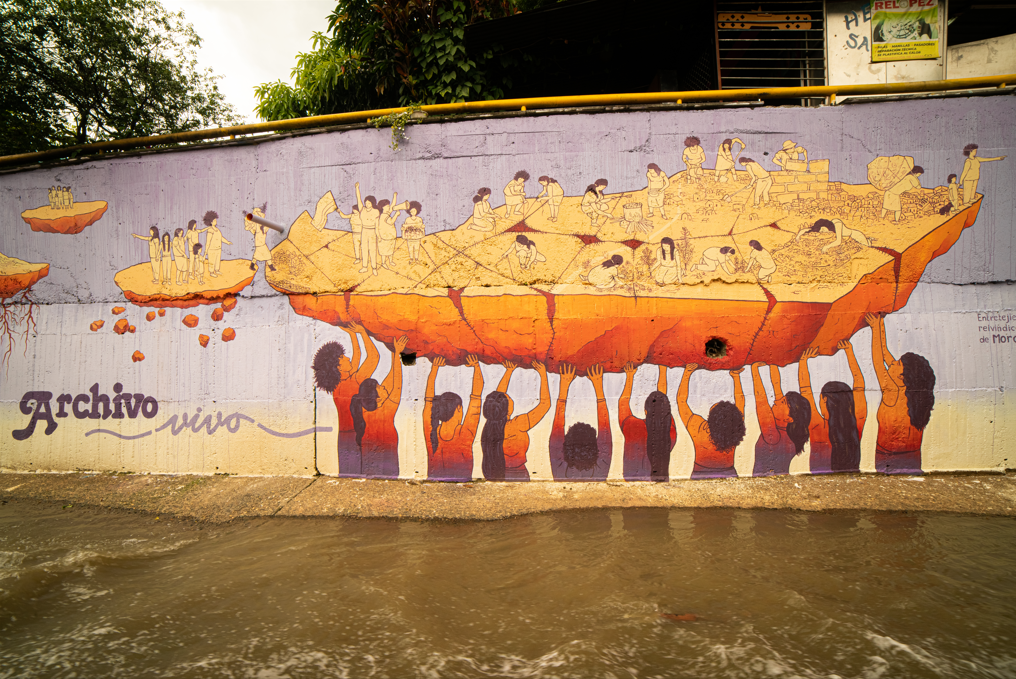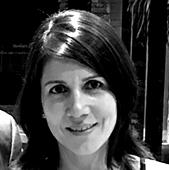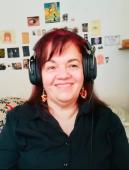Living Archives [Archivo Vivo]: Weaving gendered (hi)stories of Territorial Reclamation
Project, IF-PRJ-0006

Phase 2 Projects - Commissions (Sep 2022-Sep 2023)
Central and South America
Intro:
Living Archives [Archivo vivo]: Weaving gendered (hi)stories of Territorial Reclamation is a collaborative research-based design project that seeks to recognise practices of urban reclamation, led by women in Moravia, Medellin (Col). Moravia is a neighbourhood of ‘migrants' in constraint flux and originated in the 70’s as a by-product of forced displacements, the violence of war and social injustices still facing ongoing threats of eviction. Archivo Vivo is a collaborative project that documents stories of territorial reclamation in Moravia (Medellín, Colombia). It focuses on the living heritage of the city, which is constituted by processes of community organisation and neighbourhood self-construction. Archival processes involve multiple forms of recording who we are and what we do. This project seeks to recognise practices of urban reclamation led by women as part of the living archive of Moravia. The collaboration was guided by the following questions:
How can we recognise the practices of territorial reclamation led by the women as part of the living archive of Moravia?
Carrousel: https://www.flickr.com/photos/dpu-ucl/albums/72177720312552216/with/53320417156
Approach:
Using a living archive approach, we engage in co-creation processes focused on revealing processes and practices of memory transmission and future envisioning in Moravia. Together with our partners, we challenged narratives about stigmatised communities and places while engaging in creative yet critical responses to the present and exposing alternative paths to the future. We used living archives as a decolonial methodology to re-centre life to imagine forms of living heritage based on relational forms of thinking and being. This approach allowed us to include textile practices, social cartographies, audio-visual material, historical photos, maps, and everyday interactions that capture the polyphony of (hi)stories and the multiplicity of spatial practices often silenced. This work aims to contribute to the processes of social mobilisation, territorial agreements, and community learning.
The project proposed two intertwined strategies of co-creation: gendering the archive and weaving (hi)stories of reclamation to reframe a repository of urban memory and living heritage into a process of collective imagination to counteract the existing enduring eviction threats. In Moravia, living archives have been crucial in mobilising women's emancipatory transformation and as artefacts for advocacy. Our project focuses on the living heritage of the city, which is constituted by processes of community organisation and neighbourhood self-construction. We agreed to focus on three issues that are at the heart of the territory's historical and current claims for the right to the city: security of tenure, ‘reception’ of migrants and ecological reparations. Through processes of co-creation, we found that living archives 1) are inscribed in bodies, self-built urban spaces, and collective reclamation practices, 2) can help to specialise our emotions to bridge connections with our past in the present, triggering processes of territorial healing (Ortiz & Gómez-Córdoba, 2023) and 3 ) represent a call for collective actions that observe, recognise and appreciate the territory as an ‘affective infrastructure of knowledge co-production’ (Ortiz et al., 2022). Through a living archive, communities establish multi-temporal conversations about their connections to the territory, to reveal everyday interactions, the polyphony of histories and the multiplicity of often silenced spatial practices.
Manifesto:
This project documents different ways to frame a living archive departing from our engagement with diverse community organisations in Moravia. We understand Moravia’s Living Archive as a collective project led by the following premises:
Team:
Archivo Vivo de Moravia is a project coordinated by Catalina Ortiz (DPU, University College London), Natalia Villamizar Duarte (School of Architecture, Planning and Landscape, Newcastle University), Luz Mila Hernandez (Moravia Resiste), Eliana Torres Toro (Planearte SAS) and Monica Saldarriaga, Centro de Desarrollo Cultural de Moravia.
The learning alliance have been integrated by scholars and students of the MSc Building and Urban Design in Development from DPU, University College London, scholars from Newcastle University (2023), the team of the Centro de Desarrollo Cultural de Moravia (CDCM), Planearte SAS, members of the various community organisations in Moravia such as Moravia Resiste, JARUM, Fundación Oasis Tropical, Colectivo TriciLab, Mama Chila Tours, and the Red Cultural Comuna 4.
The project was funded by the 2nd round of commissioned projects of “Imagining Futures Through Un/Archived Pasts’ led by the University of Exeter and sponsored by AHRC- GCRF.
Outputs:
This collaborative project recognises and documents the stories of territorial reclamation in Moravia (Medellín, Colombia) as part of the city's living heritage. The research and repository documents decades of community-led processes and serves as a tool for managing neighbourhood information.
https://imaginingfutures.world/projects/archivo-vivo-living-archive-weaving-gender-histories-of-urban-reclamation-in-moravia/
Central and South America
Intro:
Living Archives [Archivo vivo]: Weaving gendered (hi)stories of Territorial Reclamation is a collaborative research-based design project that seeks to recognise practices of urban reclamation, led by women in Moravia, Medellin (Col). Moravia is a neighbourhood of ‘migrants' in constraint flux and originated in the 70’s as a by-product of forced displacements, the violence of war and social injustices still facing ongoing threats of eviction. Archivo Vivo is a collaborative project that documents stories of territorial reclamation in Moravia (Medellín, Colombia). It focuses on the living heritage of the city, which is constituted by processes of community organisation and neighbourhood self-construction. Archival processes involve multiple forms of recording who we are and what we do. This project seeks to recognise practices of urban reclamation led by women as part of the living archive of Moravia. The collaboration was guided by the following questions:
How can we recognise the practices of territorial reclamation led by the women as part of the living archive of Moravia?
- What socio-spatial practices constitute the living archive of Moravia?
- How does weaving socio-spatial strategies to imagine urban futures for Moravia promote the permanence of the inhabitants?
- How can we communicate and make Moravia's living archive visible as a reparation tool?
Carrousel: https://www.flickr.com/photos/dpu-ucl/albums/72177720312552216/with/53320417156
Approach:
Using a living archive approach, we engage in co-creation processes focused on revealing processes and practices of memory transmission and future envisioning in Moravia. Together with our partners, we challenged narratives about stigmatised communities and places while engaging in creative yet critical responses to the present and exposing alternative paths to the future. We used living archives as a decolonial methodology to re-centre life to imagine forms of living heritage based on relational forms of thinking and being. This approach allowed us to include textile practices, social cartographies, audio-visual material, historical photos, maps, and everyday interactions that capture the polyphony of (hi)stories and the multiplicity of spatial practices often silenced. This work aims to contribute to the processes of social mobilisation, territorial agreements, and community learning.
The project proposed two intertwined strategies of co-creation: gendering the archive and weaving (hi)stories of reclamation to reframe a repository of urban memory and living heritage into a process of collective imagination to counteract the existing enduring eviction threats. In Moravia, living archives have been crucial in mobilising women's emancipatory transformation and as artefacts for advocacy. Our project focuses on the living heritage of the city, which is constituted by processes of community organisation and neighbourhood self-construction. We agreed to focus on three issues that are at the heart of the territory's historical and current claims for the right to the city: security of tenure, ‘reception’ of migrants and ecological reparations. Through processes of co-creation, we found that living archives 1) are inscribed in bodies, self-built urban spaces, and collective reclamation practices, 2) can help to specialise our emotions to bridge connections with our past in the present, triggering processes of territorial healing (Ortiz & Gómez-Córdoba, 2023) and 3 ) represent a call for collective actions that observe, recognise and appreciate the territory as an ‘affective infrastructure of knowledge co-production’ (Ortiz et al., 2022). Through a living archive, communities establish multi-temporal conversations about their connections to the territory, to reveal everyday interactions, the polyphony of histories and the multiplicity of often silenced spatial practices.
Manifesto:
This project documents different ways to frame a living archive departing from our engagement with diverse community organisations in Moravia. We understand Moravia’s Living Archive as a collective project led by the following premises:
- Inhabited: Constantly empowered by the active community of the neighbourhood and its practices of territorial reclamation, reflecting the diverse interests and documentary needs.
- Territorial: Rooted in urban spaces, memory, struggle, and territorial community expression.
- Polyphonic: Composed of multiple voices, perspectives, and narratives and created jointly among diverse participants, reflecting collective effort.
- Feminist: Focused on values of equality, empowerment, and the vindication of Moravian women's rights. Challenges hetero-patriarchal values.
- Affection-based: Based on collective relationships of affection, empathy, and mutual respect.
- Mobilises action: Inspires and encourages active participation for change that decides and agrees collectively, recognising spaces for dissent.
- Active: Always in use, updating, and evolving.
- Unfinished: Constantly under construction and open to new records, analysis, and new forms of visualising information.
- Decentralized: It is manged by multiple stake holder and is promoted by community organizations and members of the different alliances.
- Distributed: it is available if both physical and digital locations to facilitate access and participation from different users and contributors.
Team:
Archivo Vivo de Moravia is a project coordinated by Catalina Ortiz (DPU, University College London), Natalia Villamizar Duarte (School of Architecture, Planning and Landscape, Newcastle University), Luz Mila Hernandez (Moravia Resiste), Eliana Torres Toro (Planearte SAS) and Monica Saldarriaga, Centro de Desarrollo Cultural de Moravia.
The learning alliance have been integrated by scholars and students of the MSc Building and Urban Design in Development from DPU, University College London, scholars from Newcastle University (2023), the team of the Centro de Desarrollo Cultural de Moravia (CDCM), Planearte SAS, members of the various community organisations in Moravia such as Moravia Resiste, JARUM, Fundación Oasis Tropical, Colectivo TriciLab, Mama Chila Tours, and the Red Cultural Comuna 4.
The project was funded by the 2nd round of commissioned projects of “Imagining Futures Through Un/Archived Pasts’ led by the University of Exeter and sponsored by AHRC- GCRF.
Outputs:
- Digital repository
- Report Living Archive Moravia 2023
- Archivo vivo Mural by Dubián Monsalve
- Parque de las Canillas Mural by La Jefa
- Exhibition and open dialogue ‘tejiendo barrio’!
- Videos produced by Tricilab
- Summary of results [video resumen resultados] https://www.youtube.com/watch?v=3fgFJUWXprk&list=PLYQVppgi8V3Eo5zJXoog88JmXV2jTMmXV&index=1
- Reception of migrants [Migracion] https://www.youtube.com/watch?v=RYbETUT2NpE&list=PLYQVppgi8V3Eo5zJXoog88JmXV2jTMmXV&index=3
- Environmental reparation [Regeneracion] https://www.youtube.com/watch?v=ude2xlh8VG8&list=PLYQVppgi8V3Eo5zJXoog88JmXV2jTMmXV&index=4
- Security of Tenure [Tenencia] https://www.youtube.com/watch?v=T2awSD5t88Y&list=PLYQVppgi8V3Eo5zJXoog88JmXV2jTMmXV&index=2
This collaborative project recognises and documents the stories of territorial reclamation in Moravia (Medellín, Colombia) as part of the city's living heritage. The research and repository documents decades of community-led processes and serves as a tool for managing neighbourhood information.
https://imaginingfutures.world/projects/archivo-vivo-living-archive-weaving-gender-histories-of-urban-reclamation-in-moravia/
Loading...


